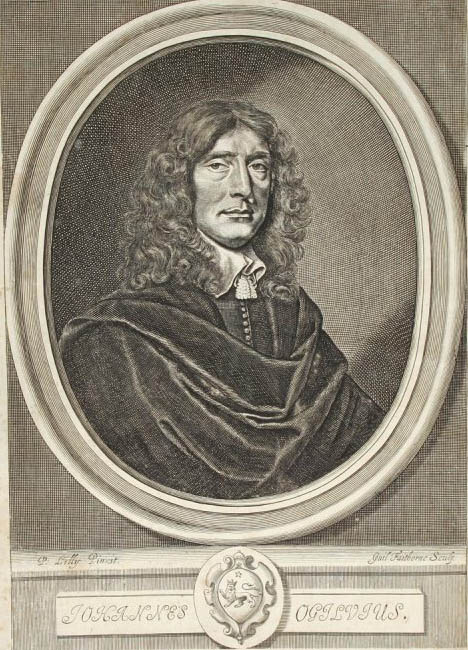“But time irreparable hasts away.”
The Works of Publius Virgilius Maro (2nd ed. 1654), Virgil's Georgicks
John Ogilby war ein schottischer Tänzer, Tanzmeister, Impresario, Übersetzer klassischer Epen und Fabeln, Dichter, Buchhändler, Verleger, sowie königlicher Zeremonienmeister, Buchdrucker und Kosmograph.
Ogilbys frühe Karriere als Tänzer endete bereits 1621, als er einen Unfall erlitt und von diesem Zeitpunkt an auf einem Bein lahm war. Danach kam Ogilby nach Irland, wo ihn der englische Statthalter Thomas Wentworth als Tanzmeister und Schreiber engagierte. Er gründete mit dem Werburgh Street Theatre Dublins erstes Theater und war von 1638 an als Master of the Revels für die Vergabe von Lizenzen für Masques und Theateraufführungen in Irland zuständig.
Nach Ausbruch des Bürgerkriegs in England 1641 wurde sein Gönner Wentworth auf dem Schafott hingerichtet und das Schauspielhaus in Dublin geschlossen. Daraufhin kehrte Ogilby nach England zurück, lernte Latein und Griechisch und übersetzte Vergil, Äsop und Homer ins Englische. Mit den Aesopicks, einer auf den Fabeln Äsops basierenden und durch eigene Geschichten erweiterten satirischen Verserzählung, kritisierte Ogilby die politischen und gesellschaftlichen Zustände in England.
Seine Werke ließ Ogilby von Künstlern wie Wenzel Hollar oder Francis Cleyn illustrieren. Durch ästhetisch aufwendig gestaltete Ausgaben erwarb er sich ein Renommee, das ihm unter anderem den Auftrag verschaffte, den Krönungsfestzug Karls II. durch die Londoner City im Jahr 1661 in einem Prachtband zu dokumentieren . Als Verleger gehörte Ogilby zu den Pionieren der Subskription im englischen Verlagsgeschäft des 17. Jahrhunderts.
Im Jahr 1671 gründete Ogilby eine eigene Druckerei und konzentrierte sich auf die Herausgabe geographischer Werke. Am bekanntesten wurde der 1675 veröffentlichte Atlas Britannia. Mit seiner spezifischen Art der Darstellung bestimmte Ogilbys Britannia Straßenpläne bis weit ins 18. Jahrhundert und gilt heute als Meilenstein in der Entwicklung von Straßenatlanten.
Wikipedia

“But time irreparable hasts away.”
The Works of Publius Virgilius Maro (2nd ed. 1654), Virgil's Georgicks
“Of Pride in thy Prosperity beware,
Vicissitudes of Fortune Constant are.”
Fab. LXII: Of the Gourd, and the Pine
The Fables of Aesop (2nd ed. 1668)
“I feel the Sparks of my old Flame revive.”
The Works of Publius Virgilius Maro (2nd ed. 1654), Virgil's Æneis
“A horrid Monster, huge, deform'd, and blind.”
The Works of Publius Virgilius Maro (2nd ed. 1654), Virgil's Æneis
“What strange Dreams disturb my rest?”
The Works of Publius Virgilius Maro (2nd ed. 1654), Virgil's Æneis
The Works of Publius Virgilius Maro (2nd ed. 1654), Virgil's Æneis
“People that under Tyrant Scepters live,
Should each to other kind Assistance give.”
Fab. XLVIII: Of the Horse and laden Ass, Moral
The Fables of Aesop (2nd ed. 1668)
“Such strength hath Custome in each tender Soul.”
The Works of Publius Virgilius Maro (2nd ed. 1654), Virgil's Georgicks
“Ambush'd in grass, a deadly Serpent lyes.”
The Works of Publius Virgilius Maro (2nd ed. 1654), Virgil's Bucolicks
“Great Expectations oft to nothing come.”
Fab. VIII: Of the Mountain in Labour
The Fables of Aesop (2nd ed. 1668)
“I the Mountain take,
Bearing my aged Father on my Back.”
The Works of Publius Virgilius Maro (2nd ed. 1654), Virgil's Æneis
The Works of Publius Virgilius Maro (2nd ed. 1654), Virgil's Æneis
“I'le delight in Vales, near pleasant Floods,
And unrenown'd, haunt Rivers, Hills and Woods.”
The Works of Publius Virgilius Maro (2nd ed. 1654), Virgil's Georgicks
“Whilst a Soul supports this mortal Frame,
I never shall forget Eliza's name.”
The Works of Publius Virgilius Maro (2nd ed. 1654), Virgil's Æneis
“True Valour best is without Witness shown.”
Fab. IX: Of the Lyon and the Mouse
The Fables of Aesop (2nd ed. 1668)
The Works of Publius Virgilius Maro (2nd ed. 1654), Virgil's Æneis
“If Men, and Mortal Powers you not regard,
Yet know, the Gods both Right and Wrong record.”
The Works of Publius Virgilius Maro (2nd ed. 1654), Virgil's Æneis
“Can in Celestial minds such Passion reign?”
The Works of Publius Virgilius Maro (2nd ed. 1654), Virgil's Æneis
“In all parts cruel Grief, in all parts Fear,
And Death in various Shapes seen every where.”
The Works of Publius Virgilius Maro (2nd ed. 1654), Virgil's Æneis
“This Story may
Delightful be to tell another day.”
The Works of Publius Virgilius Maro (2nd ed. 1654), Virgil's Æneis
“His active Soul a thousand waies divides,
And swift through all imaginations glides.”
The Works of Publius Virgilius Maro (2nd ed. 1654), Virgil's Æneis
“He is too blest that his own Happiness knows,
And Mortals to themselves are greatest Foes.”
Fab. II: Of the Dog and Shadow
The Fables of Aesop (2nd ed. 1668)
“The Queen neglected Fame for Love.”
The Works of Publius Virgilius Maro (2nd ed. 1654), Virgil's Æneis
The Works of Publius Virgilius Maro (2nd ed. 1654), Virgil's Bucolicks
The Works of Publius Virgilius Maro (2nd ed. 1654), Virgil's Bucolicks
Fab. IX: Of the Lyon and the Mouse, Moral
The Fables of Aesop (2nd ed. 1668)
The Works of Publius Virgilius Maro (2nd ed. 1654), Virgil's Georgicks
The Works of Publius Virgilius Maro (2nd ed. 1654), Virgil's Æneis